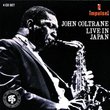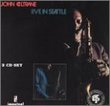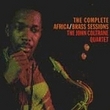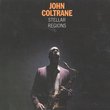| All Artists: John Coltrane Title: Olatunji Concert: Last Live Recording Members Wishing: 2 Total Copies: 0 Label: Universal/Polygram Original Release Date: 1/1/2001 Re-Release Date: 9/21/2001 Album Type: Import Genre: Jazz Style: Avant Garde & Free Jazz Number of Discs: 1 SwapaCD Credits: 1 |
Search - John Coltrane :: Olatunji Concert: Last Live Recording
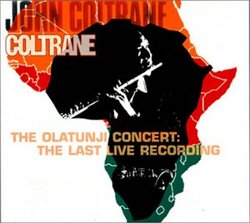 | John Coltrane Olatunji Concert: Last Live Recording Genre: Jazz
Recorded just a few months before John Coltrane's death on July 17, 1967, the importance of this document cannot be overstated. It captures the legendary tenor and soprano saxophonist live in concert at the Olatunji Center... more » |
Larger Image |
CD DetailsSynopsis
Amazon.com Recorded just a few months before John Coltrane's death on July 17, 1967, the importance of this document cannot be overstated. It captures the legendary tenor and soprano saxophonist live in concert at the Olatunji Center of African Culture in Harlem. Backed by an ensemble featuring his wife, pianist Alice Coltrane, bassist Jimmy Garrison, drummer Rashied Ali, and saxophonist Pharoah Sanders, Coltrane unleashes his most impassioned and complex performance on disc. The two extended compositions on this date, the Afro-Brazilian folk tune "Ogunde" and "My Favorite Things," are taken to their harmonic and rhythmic limits by Coltrane and company. Coltrane quite simply went where no musician had gone before. --Eugene Holley Jr. Similar CDs
|
CD ReviewsThe Finnegans Wake of jazz Eric Krupin | Salt Lake City, UT | 12/16/2007 (5 out of 5 stars) "It occurred to me while listening to this record just now that Coltrane's career had a similar arc to that of James Joyce.
James Joyce wrote "Dubliners". John Coltrane recorded "Giant Steps". An instantly recognized classic in a distinctive new idiom. James Joyce wrote "Ulysses". John Coltrane recorded "A Love Supreme". A masterpiece so revolutionary that some felt vaguely disturbed by it. James Joyce wrote "Finnegans Wake". John Coltrane - probably knowing that this would be his final spring on Earth - walked on stage in an African center in Harlem on April 3, 1967 and played this music. Either genius or madness... but only a genius could say with certainty which. I'll call it genius. Certainly - as even its detractors must acknowledge - all-but-superhuman in its musical and emotional intensity. Knowing as we do the death-shadowed nature of this performance, it can't help but seem as if Coltrane is trying to hurl whatever dwindling force remains in his physical being out towards his Creator through the medium of a Selmer saxophone. In light of the above drama - not to mention its contribution towards remedying the unfortunate under-documentation of one of the great unheralded free jazz pianists: Alice Coltrane - you'll excuse my not considering it a dealbreaker that it wasn't recorded in Dolby 5.1 Surround. I've got some horizon-expanding for those who consider this below-average bootleg quality... You'd be surprised how low in the fi department a truly passionate fan of the artist can still find the music. There are bootlegs marketed to these people. To use a what I hope will be a more fixed reference point for most readers: I say it starts about halfway between FM and AM quality, and slowly degrades about halfway closer to AM quality. Is this a level that will require the listener to, you know, actively pay attention to appreciate what's being played? Sure. But only those who recognize that - whether they end up "liking" it or not - this final, anarchic, soul-shriving stage in Coltrane's decade-long explosion of artistry must be respectfully attended to by any serious student of the work will be interested in such music to begin with. I personally experience the sound quality as almost a protective shield between my eardrums and the savagery of the rasping overblown notes. While I bet it would indeed have been an almost religiously cathartic experience to attend this concert in person, I also bet that few of those who did left without a headache." |

 Track Listings (3) - Disc #1
Track Listings (3) - Disc #1